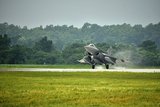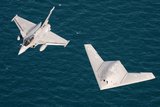Israel to equip F-16I fleet with Elbit self-protection upgrade
The Israeli Air Force operate nearly 100 F-16I jets. (Photo: IDF)
The Israel Ministry of Defense (IMoD) has awarded Elbit Systems a US$80-million contract for the development and installation of an advanced airborne self-protection suite on its F-16I Sufa fleet.
According to Elbit, the suite will include an electronic warfare (EW) solution, integrated with an advanced electro-optical passive missile warning and launch detection system as well as a chaff and flare dispensing system for protection against guided missiles.
These systems will enable “enhanced protection” from a variety of threats, the technology company added.
The deal is seen by the IMoD as helping to provide "production independence in Israeli defence industries and reduce dependency on external factors.
"This is to ensure the IDF’s qualitative military edge and support its current and future operational needs under all conditions."
This award is one such recent contract Elbit has made with air forces in the last year to boost fleet survivability against electronic warfare threats. In 2024, it was awarded with US$175 million worth of contracts to supply an EW and directed infrared countermeasure self-protection suite to a NATO European country.
Israel operates 97 F-16I Sufa jets in its fleet, out of an ordered 102, which Lockheed Martin produced specifically for the country according to IAF requirements.
Related Equipment in Defence Insight
More from Air Warfare
-
![Further investments in OWE and launchers to boost British Army deep fires capability]()
Further investments in OWE and launchers to boost British Army deep fires capability
Two contracts are expected to be signed by March 2026 that will help bolster the force’s capabilities, with further trials of the launcher expected across other departments.
-
![Scaling for diverse fleet needs: How many CCA will be acquired per crewed aircraft?]()
Scaling for diverse fleet needs: How many CCA will be acquired per crewed aircraft?
There is currently no industry standard in the ratio of uncrewed to crewed aircraft. Because collaborative combat aircraft vary widely in capability and crewed-uncrewed teaming availability, while country-specific requirements vary, it is unlikely that a single CCA configuration will meet all operational needs.
-
![Focus on economy over capability highlights the cost imperative for CCA success]()
Focus on economy over capability highlights the cost imperative for CCA success
Striking the right balance between cost and capability is likely to become more crucial in the increasingly competitive collaborative combat aircraft market. Shephard’s special CCA market report examines where the opportunities lie for suppliers.
-
![Saudi Arabia air report: The world’s fourth-largest UAV market seeks to strengthen domestic industry]()
Saudi Arabia air report: The world’s fourth-largest UAV market seeks to strengthen domestic industry
With $9.18 billion in uncontracted programmes — including a potential multi-billion-dollar MQ-9B deal — Saudi Arabia’s UAV sector is poised for significant further growth and industrial expansion.























